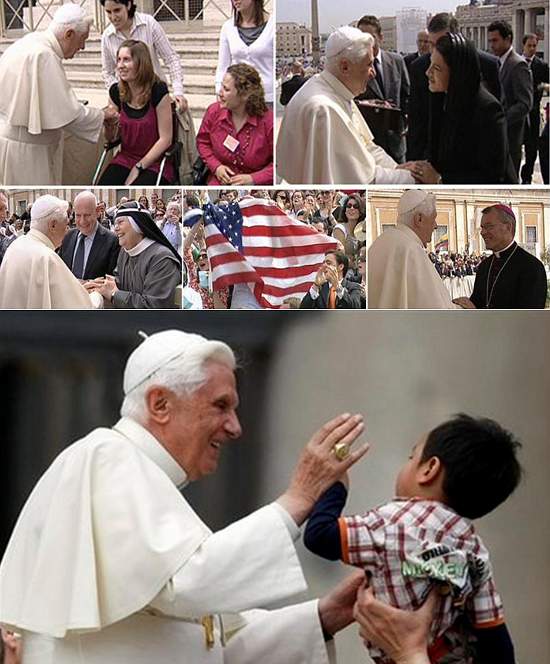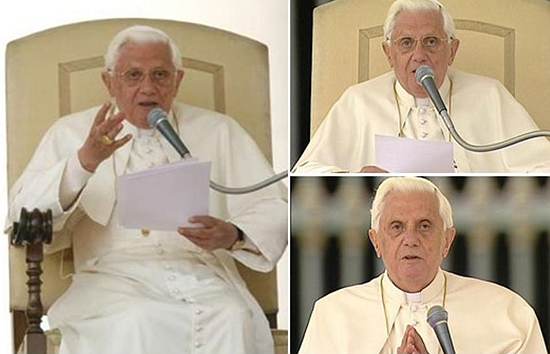
Bildet over er fra dagens onsdagsaudiens på Petersplassen – tekst og bilder jeg jeg henta fra Papa Ratzinger Forum. Paven holder ganske lange bibeltimer hver uke, og under de neste bildene kan vi lese hva han sa i dag om påskens hellige triduum, som begynner i morgen.

Dear brothers and sisters,
Holy Week, which for us Christians is the most important week of the year, offers us the opportunity to immerse ourselves in the central events of the Redemption, to re-live the Paschal mystery, the great mystery of the faith. Starting tomorrow afternoon, with the Mass of the Lord’s Supper, the solemn liturgical rites will help us to meditate more vividly on the passion, death and resurrection of the Lord on the days of the Holy Paschal Triduum, the fulcrum of the entire liturgical year.
May the divine grace open our hearts to understanding the inestimable gift of salvation obtained for us by the sacrifice of Christ. We find this immense gift described wonderfully in the famous hymn from St. Paul’s Letter to the Philippians (cfr 2,6-11), which we have meditated on many times during Lent. The apostle reviews, in a way that is as essential as it is effective, all the mystery of the story of salvation, citing the arrogance of Adam who, not being God, wished to be like God.
And he contrasts this arrogance of the first man – which all of us feel a bit in our being – the humility of the true Son of God who, having become man, except for sin, pushed himself to the depths of death. This descent to the ultimate depth of suffering and death is followed by his exaltation, true glory, the glory of love which gives to the end.
It is therefore right, as Paul says, «that at the name of Jesus every knee should bend, of those in heaven and on earth and under the earth, and every tongue confess that Jesus Christ is Lord» (2,10-11). St. Paul refers, with these words, to a prophecy of Isaiah where God says, «I am God… To me every knee shall bend» (cfr Is 45, 23). This, says Paul, applies to Jesus Christ. It is truly he, in his humility, in the true greatness of his love, who is the Lord of the world, and before him every knee should bend.
How marvelous, as well as surprising, is this mystery! We can never sufficiently meditate on this reality. Jesus, although he was God, did not wish to keep his divine prerogatives as his exclusive possession. He did not want to use his being God, his glorious dignity and his power, as an instrument of triumph and a sign of distance from us. On the contrary, «he emptied himself», assuming the misery and weakness of the human condition – and here, Paul uses a Greek word pregnant with meaning, kenosis, for this descent by Jesus.
Divine form (morphe) concealed itself in Jesus under human form – that is, under our reality which is marked by suffering, poverty, our human limitations, and death. This radical and true sharing of our nature, sharing everything except sin, led him to that frontier which is the sign of our finiteness, death. But all this was not the fruit of some obscure mechanism or blind fatality: it was, rather, his free choice, out of generous adherence to God’s plan for salvation.
The death towards which he went, Paul says, was that on the cross, the most humiliating and degrading that one can imagine. All this, the Lord of the universe fulfilled out of love for us. Out of love, he wished to empty himself and make himself our brother. Out of love, he shared our human condition, that of every man and every woman.
A great witness of the Oriental Christian tradition, Theodoretus of Ciro, wrote about this: «Being God, and God by nature, and being equal to God, he did not consider this of any importance, as those who receive any honor above their true merits, but hiding his own merits, he chose the most profound humility and took the form of a human being» (Commentary on the Letter to the Philippians, 2,6-7).
A prelude to the Paschal Triduum which, as I said, starts tomorrow with the evocative afternoon rites of Maundy Thursday, is the solemn Mass of the Chrism, which in the morning, the Bishop celebrates with his own priests, during which together, they will renew the priestly vows they made on the day of their ordination. It is a gesture of great value, an occasion that could not be more propitious for priests to reaffirm their faithfulness to Christ who chose them to be his ministers.
This priestly gathering additionally takes on a particular significance at this time, because it is almost like a preparation for the Year of the Priest that I declared on the occasion of the 150th death anniversary of the Holy Curate of Ars (St John Vianney) and which will start on June 19.
Also at the Chrismal Mass, the oils for the sick and for catechumens will be blessed, and the Chrism will be consecrated. These rites symbolically stand for the fullness of Christ’s Priesthood and that ecclesial communion that should animate the Christian people, gathered together for the Eucharistic sacrifice and revived in unity by the gift of the Holy Spirit.
In the afternoon Mass, called ‘in Coena Domini’ (of the Lord’s Supper), the Church commemorates the institution of the Eucharist, the priestly ministry, and the new commandment of love left by Jesus to his disciples. About what happened in the Cenacle on the eve of the Lord’s passion, St. Paul offers one of the oldest testimonies. He writes: … the Lord Jesus, on the night he was handed over, took bread, and, after he had given thanks, broke it and said, «This is my body that is for you. Do this in remembrance of me.» In the same way also, he took the cup, after supper, saying, «This cup is the new covenant in my blood. Do this, as often as you drink it, in remembrance of me.» (1Cor 11,23-25)
Words charged with mystery, which manifest clearly what Christ wanted:Iin the form of bread and wine, He makes himself present, giving up his body and shedding his blood. It is the sacrifice of the new and definitive covenant offered to everyone, without distinction of race or culture. For this sacramental rite, which he hands over to the Church as the supreme proof of his love, Jesus made his disciples ministers, along with all those who would follow such ministry in the course of centuries.
Thus, Maundy Thursday constitutes a renewed invitation to give thanks to God for the supreme gift of the Eucharist, to be received with devotion and to be adored with sincere faith. That is why, the Church encourages, after the celebration of the Holy Mass, a prayer vigil in the presence of the Blessed Sacrament to remember the sad hours Jesus spent in prayer at Gethsemane before he was arrested and eventually sentenced to death.
And so we come to Good Friday, the day of the passion and crucifixion of the Lord. Every year, in silence before Jesus suspended from his wooden Cross, we realize how full of love were the words he said during the Last Supper: «This is my blood of the covenant, which will be shed for many» (cfr Mk 14,24).
Jesus offered his life in sacrifice for the remission of man’s sins. Just as it is in front of the Eucharist, so too, in the face of the passion and death on the Cross of Jesus, the mystery becomes unfathomable to reason. We are before something which appears humanly absurd: a God who not only becomes man, with all the needs of man; who not only suffers to save man by taking upon himself all the tragedy of mankind, but dies for man.
The death of Christ reminds us of the accumulation of sorrows and evils that have weighed on man at all times: the crushing weight of our death, the hatred and the violence that continue to make the earth bloody. The passion of the Lord continues in the suferrings of man. As Blaise Pascal rightly wrote, «Jesus will be in agony even to the end of the world. We must not sleep during that time.» (Pensees, 583)
If Good Friday is a day full of sorrow, it is at the same time the day most propitious to reawaken our faith, to consolidate our hope and the courage for each of us to carry our own cross with humility, trust and abandonment to God, certain of his support and his victory. The liturgy of this day sings, «O Crux, ave, spes unica – Ave, o croce, unica speranza!» (Hail, O Cross, the only hope).
This hope is nourished in the great silence of Holy Saturday, in expectation of the resurrection of Jesus. On this day, the churches are stripped bare and no particular liturgical rites are prescribed. The Church keeps vigil in prayer like Mary, and with Mary, sharing her sentiments of sorrow and trust in God. Rightly, it is recommended to keep a prayerful atmosphere throughout the day, one that is favorable to meditation and reconciliation.
The faithful are encouraged to approach the sacrament of Penitence, in order to be able to participate truly renewed in the Easter celebrations. The meditation and silence of Holy Saturday lead to the solemn Easter Vigil that night, ‘the mother of all vigils’, when the song of joy over the resurrection of Christ erupts in all churches and communities. Once more, the victory of light over shadows will be proclaimed, that of life over death, and the Church will rejoice in her encounter with the Lord. Thus we enter the climate of Easter, the Sunday of Resurrection.
Dear brothers and sisters, let us prepare ourselves to experience the Holy Triduum intensely, so that we may participate evermore profoundly in the Mystery of Christ.
May the Blessed Virgin accompany us on this itinerary, she who followed her son Jesus in silence up to Calvary, taking part with great pain in his sacrifice, thus cooperating in the mystery of Redemption and becoming the Mother of all believers (cfr Jn 19,25-27).
Together with her, let us enter the Cenacle, let us stay at the foot of the Cross, let us keep vigil ideally next to the deceased Christ, awaiting with hope the dawn of the radiant day of Resurrection. In this regard, I express to all of you my most heartfelt wishes for a joyous and holy Easter together with your families. parishes and communities.
